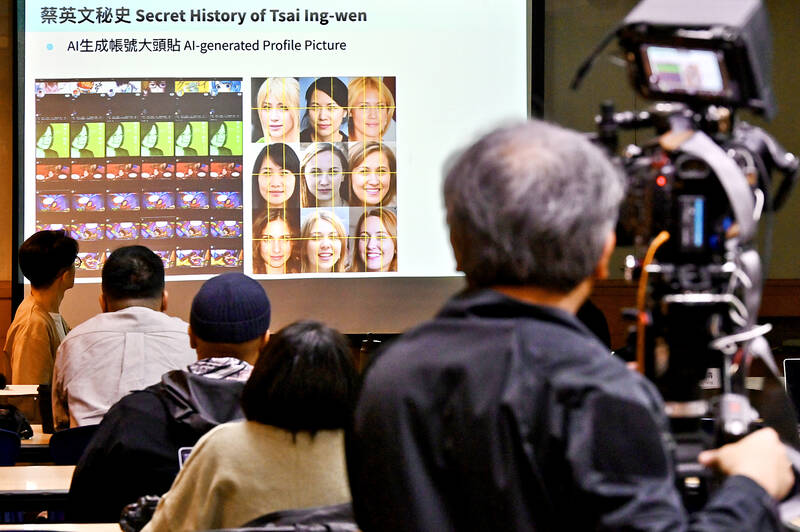China will continue to play up conflicts in Taiwan with more diverse tactics of information manipulation, Taipei-based think tank Doublethink Lab said in a report published yesterday.
The think tank analyzed the strategies and impact of the Chinese disinformation campaign on Taiwan’s presidential and legislative elections on Saturday last week and pointed out possible manipulation methods in the future.
Before last month, news outlets and social media accounts controlled by or affiliated with Chinese authorities focused on amplifying controversial issues in Taiwan to intensify social conflicts, a strategy they have adopted since 2022, the report said.

Photo: George Tsorng, Taipei Times
These foreign actors select certain narratives by Taiwanese politicians or pundits to spread US skepticism and defamatory information about the ruling party or its leaders, it said.
Leading up to the elections, Chinese actors began to create fake news, such as accusing the Democratic Progressive Party (DPP) of starting rumors about China pressurizing Taiwanese rock band Mayday to make pro-China comments, it said.
Beijing actively fueled rumors that Lai had illegitimate children and spread the content of a book titled “[President] Tsai Ing-wen’s (蔡英文) secret history,” which is filled with false statements about Tsai, it said.
Compared with the local elections in 2022, China used a large number of false accounts and generative artificial intelligence (AI) rather than its state media to disseminate disinformation, it said.
Doing so gave China more opportunities to spread slander and outrageous information, it said, adding that it also made the sources of disinformation more difficult to trace.
After the elections, Beijing is likely to continue playing up domestic conflicts in Taiwan rather than drawing Taiwanese attention to foreign actors, it said.
It might also focus on local issues to “better integrate into discussions in Taiwanese society,” and make it difficult for Taiwanese authorities and researchers to identify the source of information, it said.
Generative AI technology has significantly reduced the time and labor costs of content production, making it difficult to separate fake accounts from real users, and to detect fake accounts that originate from the same source, it said.
A survey conducted by the think tank before the elections showed that 37.6 percent of Taiwanese have never looked up or confirmed information they received online, despite a growing proportion of people receiving political information from online video creators and key opinion leaders, it said.
“Information manipulation in Taiwan has shifted toward conspiracy types of narrative,” which is more challenging to debunk, it said.
About half of the respondents agreed with US-skepticism narratives, such as “the US only wants to exploit Taiwan” and “the US uses Taiwan to provoke China,” it said.
While 40.4 percent of respondents declined to answer their perceived source of false information related to the elections, 26.6 percent of respondents attributed it to the DPP, followed by 15.2 percent who believed it originated from China, it said.
The survey was conducted via landlines and mobile phones from Jan. 1 to Wednesday last week.
It collected 1,504 valid samples and had a confidence level of 95 percent and a margin of error of 2.53 percent.

SECURITY: As China is ‘reshaping’ Hong Kong’s population, Taiwan must raise the eligibility threshold for applications from Hong Kongers, Chiu Chui-cheng said When Hong Kong and Macau citizens apply for residency in Taiwan, it would be under a new category that includes a “national security observation period,” Mainland Affairs Council (MAC) Minister Chiu Chui-cheng (邱垂正) said yesterday. President William Lai (賴清德) on March 13 announced 17 strategies to counter China’s aggression toward Taiwan, including incorporating national security considerations into the review process for residency applications from Hong Kong and Macau citizens. The situation in Hong Kong is constantly changing, Chiu said to media yesterday on the sidelines of the Taipei Technology Run hosted by the Taipei Neihu Technology Park Development Association. With

CARROT AND STICK: While unrelenting in its military threats, China attracted nearly 40,000 Taiwanese to over 400 business events last year Nearly 40,000 Taiwanese last year joined industry events in China, such as conferences and trade fairs, supported by the Chinese government, a study showed yesterday, as Beijing ramps up a charm offensive toward Taipei alongside military pressure. China has long taken a carrot-and-stick approach to Taiwan, threatening it with the prospect of military action while reaching out to those it believes are amenable to Beijing’s point of view. Taiwanese security officials are wary of what they see as Beijing’s influence campaigns to sway public opinion after Taipei and Beijing gradually resumed travel links halted by the COVID-19 pandemic, but the scale of

A US Marine Corps regiment equipped with Naval Strike Missiles (NSM) is set to participate in the upcoming Balikatan 25 exercise in the Luzon Strait, marking the system’s first-ever deployment in the Philippines. US and Philippine officials have separately confirmed that the Navy Marine Expeditionary Ship Interdiction System (NMESIS) — the mobile launch platform for the Naval Strike Missile — would take part in the joint exercise. The missiles are being deployed to “a strategic first island chain chokepoint” in the waters between Taiwan proper and the Philippines, US-based Naval News reported. “The Luzon Strait and Bashi Channel represent a critical access

Pope Francis is be laid to rest on Saturday after lying in state for three days in St Peter’s Basilica, where the faithful are expected to flock to pay their respects to history’s first Latin American pontiff. The cardinals met yesterday in the Vatican’s synod hall to chart the next steps before a conclave begins to choose Francis’ successor, as condolences poured in from around the world. According to current norms, the conclave must begin between May 5 and 10. The cardinals set the funeral for Saturday at 10am in St Peter’s Square, to be celebrated by the dean of the College